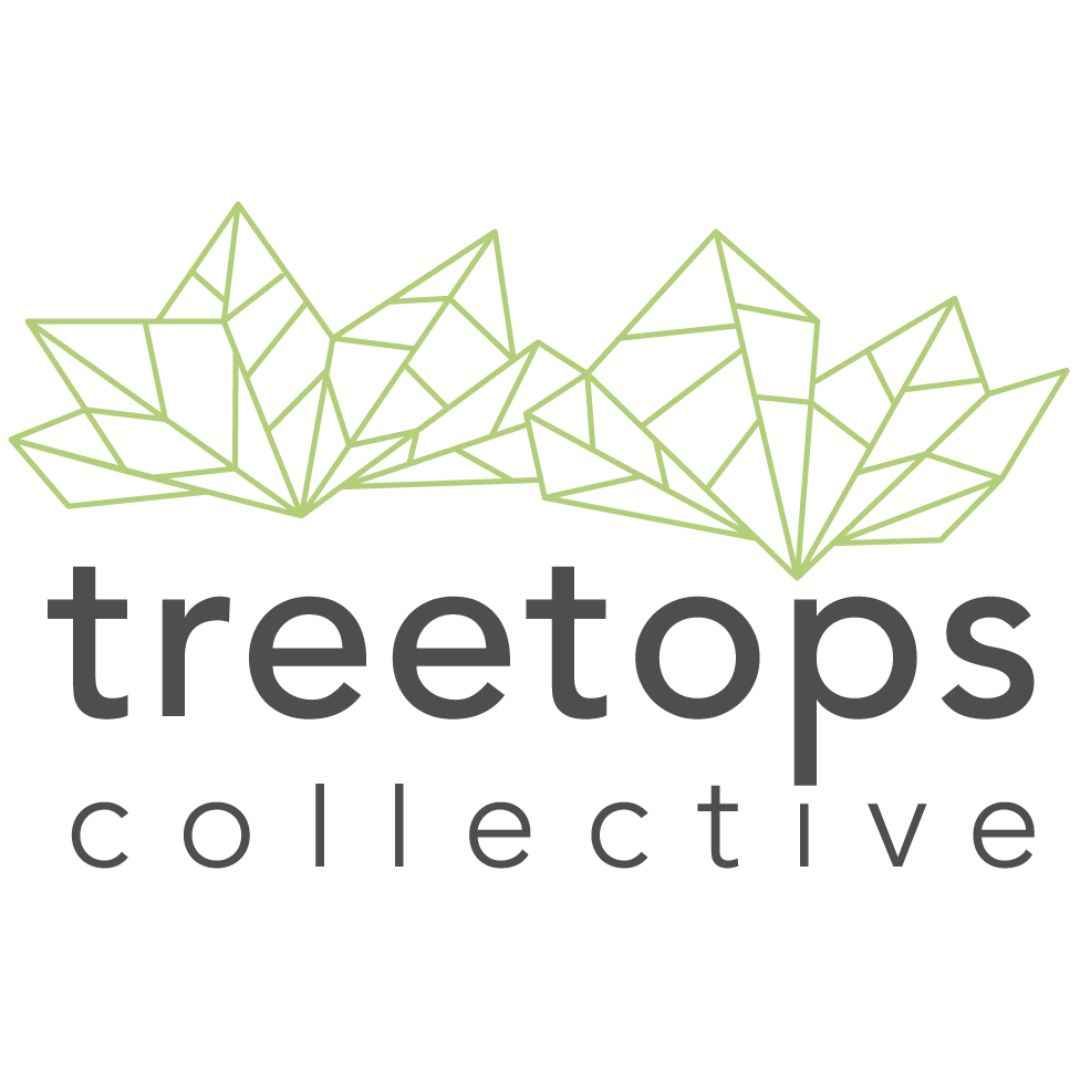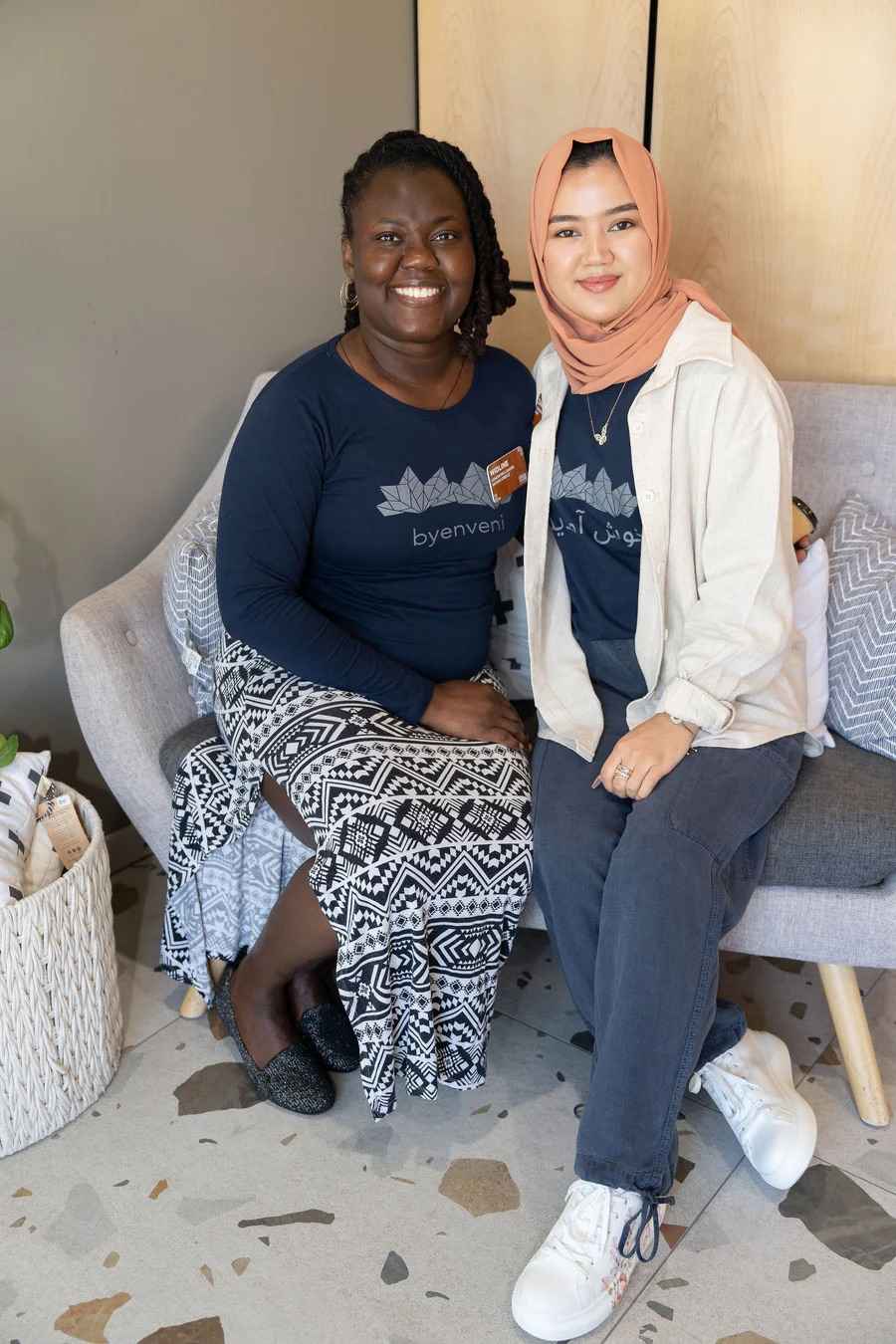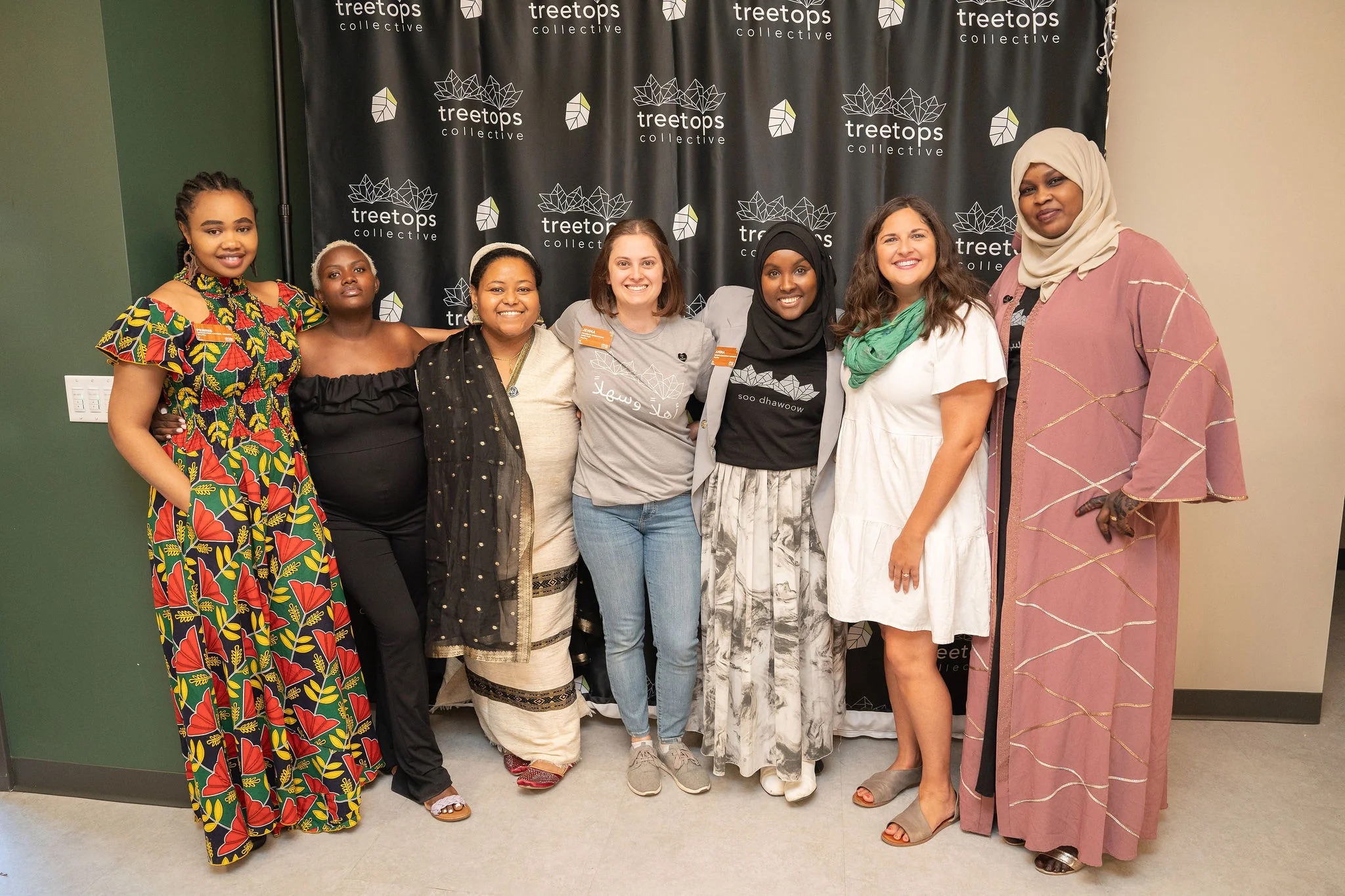As part of our Women’s History Month celebration, we connected with Kara Kurczeski Hoholik, communications manager at Treetops Collective, a Grand Rapids nonprofit organization founded and staffed by women who are making their own kind of history by focusing their efforts on assisting women and girls who are new to this country. It is vital work that, given the current political climate, is now more important than ever.
Q: What compelled you to work for a nonprofit organization dedicated to helping women and girls who are immigrants and refugees?
A: There are a number of reasons, but one of the most important to me personally are my three children, who range in age from 7 to 12. The work we do here helps foster the kind of diverse community I want my children to grow up in. I want them to be exposed to people from different cultures, with different religions and different perspectives. My work, and the connections with a very wide variety of people that job enables, are something my children benefit greatly from. They are able to broaden their horizons and deepen their understanding of other parts of the world, from the games people play and the foods that they eat to the conditions that propelled people from around the world to come to this country. In turn, the understanding my children and I gain, and the friendships that are formed, in a small but very important way helps make Grand Rapids a more welcoming place for the people served by Treetops Collective.
Q: How did the group arrive at that name?
A: The impact of a tree is often seen by its top, standing tall and providing shade, but it is the roots deep in the ground that allow for its stability and longevity. All the while, within the trunk, concentric rings grow year after year, showing not only drought or damage, but also resilience and perseverance. These hidden components of a tree, roots and rings, are the base from which health and strength emerge. Just like trees need the right soil and conditions to grow, we hope that Treetops provides this sort of space for refugee women leaders to sink their roots into. As they become established and stable in their community, they are able to reach their branches out to provide resources so we can flourish under the shade for generations to come.
Q: Why the focus on women and girls new to this country?
A: Generally speaking, women and girls face more barriers to achieving whatever their individual goals are. Getting a job, learning English, obtaining a driver’s license, finding childcare: all this and more, because of obstacles in place, can be more challenging for women and girls, both in the countries they come from and here in the United States. Since women’s goals are often related to improving their family's life as well as their own, focusing on support specifically for their unique needs multiplies our organization’s impact throughout the community and creates a ripple effect of progress for generations.
Q: What is the range of programs offered?
A: We do so much! For example, each year, through our Concentric Program, Treetops trains nine New American women to lead cohort groups of about 10 women in their same language and cultural group to build stronger networks of support for and among New American families. During the year, the leader offers support, education, and resources to her members. The leader also receives continuing education and training, often leading to certifications in her chosen field. The languages of each cohort vary year to year depending on community need and new arrivals. For example, last year was the first year we had a Ukrainian group.
Often, before newcomers are able to focus on their dreams personally and professionally, they need a comfortable and safe space to process the experience of coming to America. Our Circles of Support program offers peer-led support groups addressing migration trauma and building resilience as families establish a new home in West Michigan.
We also have our Teen Social Enterprise Program, a 10-week paid internship that allows teens new to America to immerse themselves in a creative and meaningful professional experience by helping to support the online and retail sales of the many different products we sell to help fund our organization. They also learn about the power of storytelling, plan for their future and, as a final project, design a product for Treetops' core line that shares a message they want to convey.
Besides intentional programming, we also create adjacent solutions to issues that arise naturally like driver’s training. We work with an immigrant-owned driving school and subsidize the cost of training and license testing with local grants for about 20 members each year. Especially in a city without reliable public transportation, driving is essential to a person’s freedom and independence, especially for mothers.
Q: What kind of impact do you think the organization has?
A: In terms of sheer numbers, we directly assist between 200 and 250 people a year. But the real impact of our work is hard to quantify because what we do is relation-based, and not transactional. Success is found in individuals achieving the goals they set: obtaining housing, finding a job, furthering their education. We also talk a lot about mutuality -- between staff at Treetops and members, but also with the broader community. When friendships form between New Americans and people born in this country, both sides benefit. We cook together, play together, and learn from each other. It is also important, in terms of self-worth and value, for the New Americans we work with to understand and appreciate all that they have to offer. They have gifts and skills others might not have, and bringing those to their new community, and being provided an opportunity to share them, helps the people we engage with realize that they are not a burden, but an asset. The ability to give back is what makes all of us feel of value, so a big part of what we do is help create pathways for that to happen.
Q: What is it like doing the work you do in the current political climate?
A: First, people born in America need to understand what is motivating others to come here. In that regard, the greatest common denominator we see is that a significant majority of the people coming here as refugees are escaping war and violence. If most Americans, myself included, found themselves in a similar position, they would absolutely make the same choice to leave home for a better and safer life for their family. Most of us have no context to understand the conditions people are fleeing from, and if we did, we might be more open to and accepting of their presence in our community.
Second, before refugees even arrive in the US, they are often spending years navigating the complicated refugee application process, living much of their life in an uncertain state of limbo. Some of the people we serve were born and raised in refugee camps, having already escaped one horror to find themselves in another: living in temporary tents and lacking the necessities people here take for granted. These experiences are often traumatic, and many do not share their stories because it is too difficult to talk about. Now that they have finally arrived safely; after being very carefully vetted by the U.S. government, refugees simply wish to put down their roots and live.
Another hurdle we are currently facing in this political climate, is the myth that refugees and immigrants are somehow a “burden” who drain government resources. That persistent myth could not be further from the truth. The refugees and immigrants we see are deeply appreciative of the opportunity presented them and want to show their gratitude by investing back into their new community. They want to work and provide for their families. Instead of taking resources, they want to provide them. More people need to hear, and understand, that fact so that misconceptions can be dispelled.
The biggest problem, though, might be a lack of empathy. We live in a society that is often pretty segregated in terms of race, class, and economic status, which can make it difficult to see the world through the perspective of others, especially the perspective of people who’ve faced conditions so terrible it can be hard for others to even fathom, let alone relate to.
Q: Can you think of any examples of people dealing with challenges others might have a difficult time relating to?
A: For many of the people we work with, the learning curve needed to adjust to their new lives is very steep. One that immediately comes to mind is a family who recently came to Grand Rapids this winter. Because of the living conditions they experienced before arriving here, they were unfamiliar with a home thermostat and how to use it. The family, including small children, wore coats indoors until someone was able to teach them how to turn on the heat. If something like using a thermostat requires support, imagine how great the challenge is to adapt to much larger changes and systems like education, healthcare, and legal paperwork.
Q: Are there any books you’d like to recommend?
A: I love reading, so I have plenty of recommendations! Some of my favorite books about the refugee/immigrant experience that I’ve read in the last year include “Girl in Translation” by Jean Kwok, “A Place for Us” by Fatima Farheen Mirza, “Nightbloom” by Peace Adzo Medie, and “What Strange Paradise” by Omar El Akkad. Treetops also hosts a quarterly book club with the Kent District Library and we have a full list of past titles and discussion questions on our website. But to be limited by this list is to reduce the immigrant experience to only a handful of voices when there are countless to be heard.
Q: To end this on a positive note, what gives you hope?
A: Action gives me hope. It’s easy to sit in despair while scrolling on my phone at endless headlines, but it’s a lot harder when I am out in the community taking action to make the world a better place. When I am at work talking to teens about why their voice matters, I feel hopeful for their future as leaders. When I witness hard conversations between members of different cultures that result in a resolution, I feel hopeful for our city. Hope is a verb, and to me, the best way to have hope for our future is to take steps forward together.







